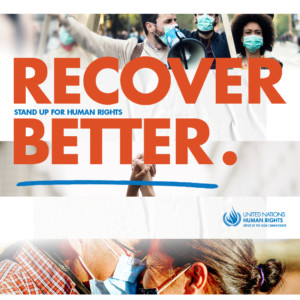
The COVID-19 crisis, that hit the world in 2020, has been fuelled by deepening poverty, rising inequalities, structural and entrenched discrimination and other gaps in human rights protection. It has been universally acclaimed, that only measures to close these gaps and advance human rights can ensure we fully recover and build back a world that is better, more resilient, just, and sustainable.
On the occasion of 2020 Human Rights Day, the Geneva Centre held an interactive virtual event with human rights practitioners from all over the world. The participants shared inspiring stories of human rights advocacy work in their communities and addressed such issues as rising inequalities, combatting racism and discrimination, bringing up the voices of the most vulnerable, and promoting the sustainable development.
The virtual discussion was moderated by Dr Umesh Palwankar, the Executive Director of the Geneva Centre. Ambassador Ghazi Jomaa, the Chairman of the Geneva Centre, delivered his Opening and Closing Remarks.
Panellists:
- Ms Salwa Mansuri (India) – Rohingya Human Rights Initiative;
- Ms Elly Pradervand (Switzerland) – Women’s World Summit Foundation;
- Dr Adil Sajwani (United Arab Emirates) – Ministry of Health, United Arab Emirates;
- Ms Diana Madibekova (United Kingdom) – PhD Researcher and Teaching Fellow;
- Ms Almas Shaikh (India) – Centre for Law and Policy Research;
- Mr Joseph Agina (Kenya) – Olkejuado Adult and Continuing Education Association;
- Ms Casey Myers (United States of America) – One Digital World;
- Pr Samia al-Amoudi (Saudi Arabia) – Health Empowerment and Health Rights Initiative.
Event Summary:
During the rich discussions, the panellists addressed a wide range of topics. Ms Mansuri challenged the stereotyped depicting of refugees in the media as helpless and vulnerable and shared some positive practices by female Rohingya refugees through which they contribute to the well-being and sustainability of their host society. Dr Sajwani focused on internal and international solidarity efforts applied by the UAE government while fighting the COVID-19 pandemic, including providing free testing and treatment to everyone within the country, and sending equipment to more than 120 countries affected by the pandemic. Ms Madibekova addressed the new forms of diplomacy that are not limited to international actors, but also include the activities implemented by the businesses. She said that the new narratives between such concepts as “business” and “peace” should be established, noting that peace is very difficult to measure since it is not only the absence of conflict but the ability to disagree and dialogue peacefully. Ms Shaikh focused on the fact that COVID-19 amplified the existing inequalities, and reiterated that it is important to have good infrastructure for delivering health services, welfare, food, rehabilitation and other services. Mr Myers brought up the topic of displaced persons and problems faced on the grassroots level when global challenges hit. Digital education is essential for the integration of the displaced persons into society, and this is what her organization “One Digital World” was working on. Pr Al-Amoudi said that in Saudi Arabia there were no differences in treating COVID-19 patients, whether they are Saudi nationals or not. She also highlighted some good practices related to Saudi women empowerment. Ms Pradervand in her statement, read out by the Geneva Centre’s Project Officer, focused on the topic of rural women empowerment and shared the annual campaign “17 Days of activism for rural women leaders and their communities” led by the Women’s World Summit Foundation. Finally, Mr Agina spoke about the challenges faced by the Maasai community, including the child marriages, child labour, female genital mutilation and gender-based violence, and the efforts made by local communities and activists to tackle these challenges.
At the end of the event, the Chairman of the Geneva Centre awarded the panellists with a Certificate of Merit issued by the Geneva Centre, commending their efforts to strengthen human rights.
Event Video: Recovery through Human Rights: Voices from the Field